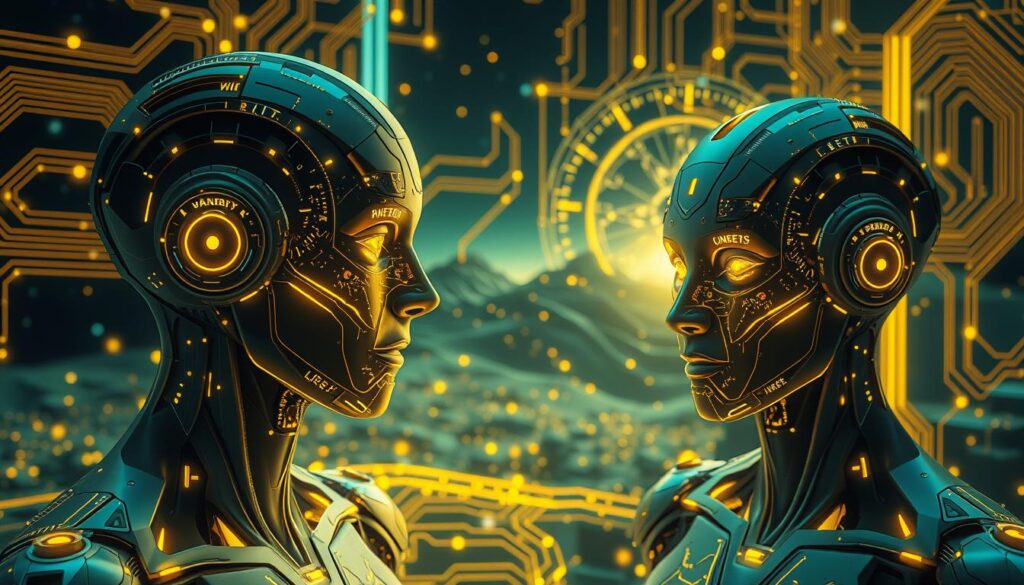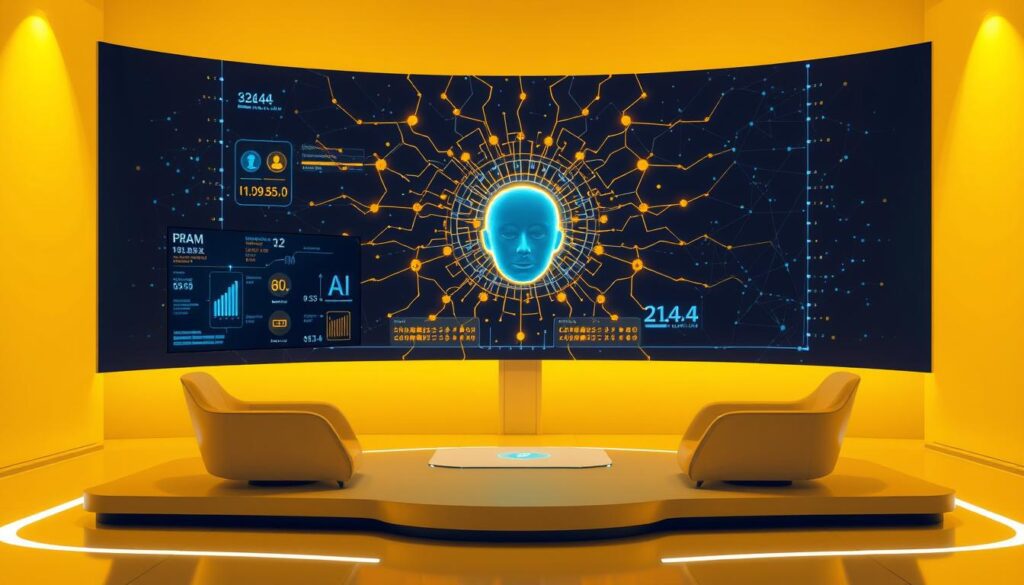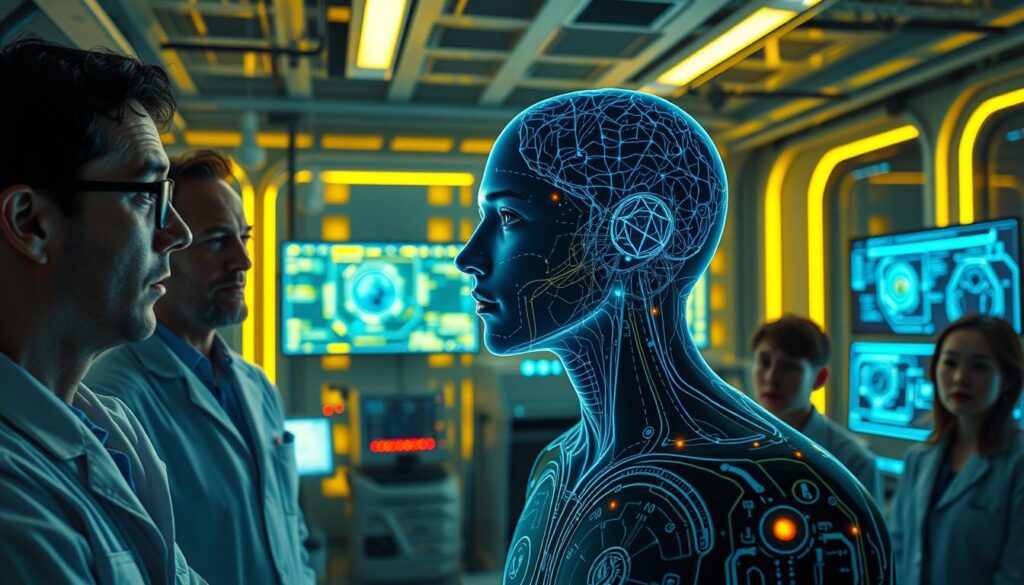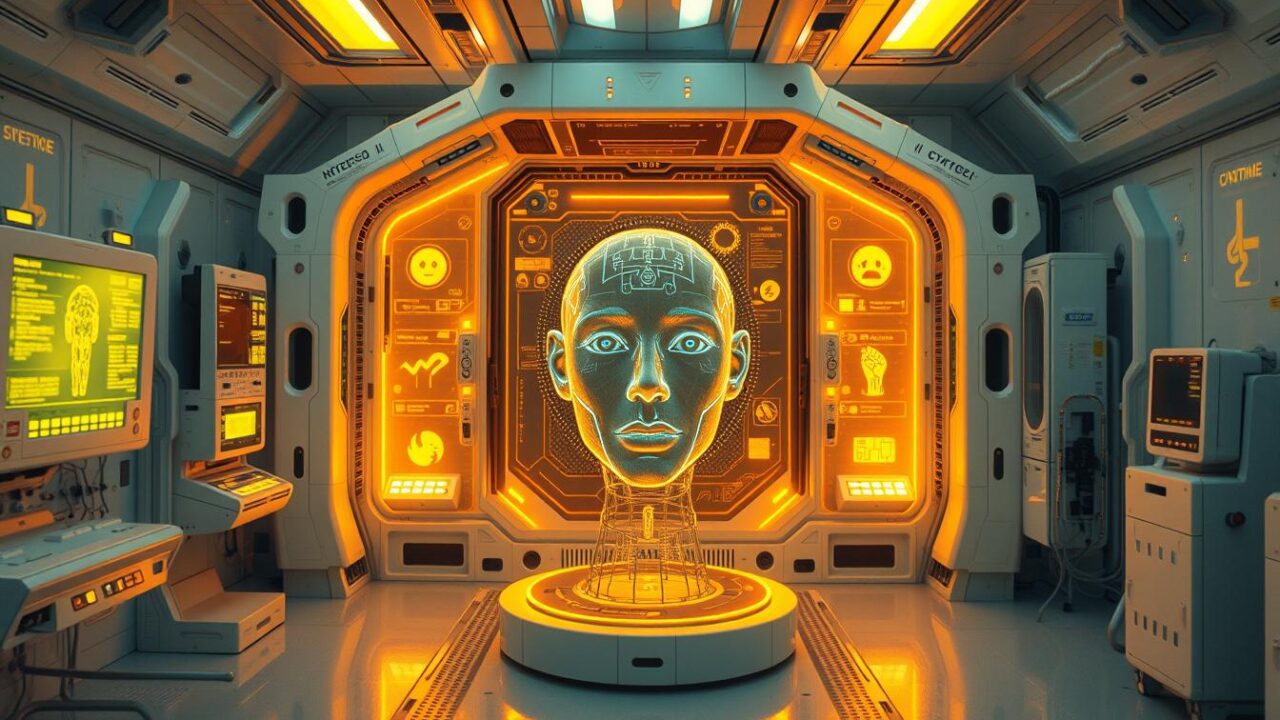Imagine having a digital twin that thinks and acts like you. Researchers from Stanford and Google DeepMind have made this dream a reality. They’ve created AI “simulation agents” that can copy a person’s personality in just hours. This breakthrough in AI makes us wonder about data privacy and ethics.
The study involved over 1,000 people in two-hour interviews. The AI models, trained on these talks, could mimic their answers with 85% accuracy. This new ability in AI cloning is exciting but also raises worries about identity theft and scams.
Exploring this new AI technology is important. OpenAI CEO Sam Altman has promised 20% of the company’s resources for safety research. The U.S. AI Safety Institute, teaming up with big tech names like Microsoft and Google, is leading the charge in safety testing.
Key Takeaways
- AI can now create a virtual replica of a person’s personality in just two hours
- The study showed an 85% accuracy rate in replicating participants’ responses
- OpenAI has increased its focus on AI safety research
- The U.S. AI Safety Institute is working with major tech firms on AI safety
- Concerns about AI-related issues like data privacy and misuse are on the rise
- The technology raises questions about identity protection and ethical use of AI
Understanding Simulation Agents: The New Frontier of AI Technology

AI simulation agents are revolutionizing tech. They can mimic human behavior with uncanny accuracy. These aren’t just simple chatbots. They’re advanced systems that learn from real people.
What Are AI Simulation Agents?
AI simulation agents are like digital twins. They mimic human thought and action. Using data from interviews, they create a digital version of someone. They can answer questions and play games like the real person.
The Stanford-DeepMind Research Breakthrough
Stanford and DeepMind made a big discovery. They created AI agents that can clone a personality in just two hours. These agents passed personality tests and games, acting just like the real people. This breakthrough opens new research doors but also raises concerns about deepfakes and manipulation risks.
How Personality Cloning Works in Practice
The process is both simple and powerful. First, a person is interviewed for two hours. They share their life and views. Then, AI uses this data to create a digital copy. This copy can chat, answer questions, and even make choices like the real person. It’s exciting for science, but it also raises legal questions.
“AI simulation agents are reshaping our understanding of human behavior and raising important questions about identity in the digital age.”
As this technology advances, we must consider its use carefully. It could benefit many fields, from psychology to professional development. But we must be cautious. In the wrong hands, these AI clones could be used for scams or spreading false information. We’re just beginning to explore this new world.
The Two-Hour Interview Process: Breaking Down the Study

The AI interview process for personality replication has made a big leap. A study with 1,000 diverse participants showed AI’s power in capturing human personalities. Each person talked about their childhood and views for two hours.
This new method is more efficient than old survey ways. AI interviews covered many topics, getting a full picture of personality. After, people did more tests and surveys for two weeks.
The results were amazing. AI replicas, or “simulation agents,” matched 85% with their human counterparts. This shows AI can accurately replicate human personalities quickly.
But, AI agents were less accurate in tests like the “dictator game.” This means AI can capture many human traits but not all.
This study has big implications. Companies are looking into using this tech for digital twins. It also makes us think about privacy, consent, and what it means to be human in an AI world.
AI Can Now Clone Your Personality in Two Hours – What is the Impact or Misuse

AI technology has made huge leaps forward, especially in cloning personalities. Now, AI can make digital copies of people in just two hours. This is both exciting and raises big concerns about privacy and security.
Accuracy Rates and Performance Metrics
Studies show AI can mimic human responses with 85% accuracy. This high precision makes us worry about misuse. Psychological effects of AI clones include stress, anxiety, and confusion about reality.
Potential Applications in Research
This technology could change social science research. AI can make personality models quickly and cheaply. This means researchers can do big studies without needing lots of people.
Risks of Unauthorized Replication
Creating realistic digital copies is a big risk. It could lead to identity theft, scams, and privacy breaches. There are also consent issues when using someone’s personality data without asking.
- Identity theft and impersonation
- Scams using cloned personalities
- Manipulation of public opinion
- Privacy violations and data misuse
As AI gets better, we must tackle these ethical and security problems. Finding a balance between progress and safety is essential. This way, we can use AI for good while avoiding its dangers.
Privacy and Data Security Implications
The rise of AI personality cloning raises big data privacy challenges. It can copy someone’s personality in just two hours. This makes strong security measures more important than ever.
Data Collection Concerns
AI face swap tech advances fast, causing data privacy worries. It’s easy to make deepfakes, which can lead to identity theft and fraud. These fake videos can also spread false information, affecting public opinion and trust online.
Storage and Protection Measures
To fight AI attacks, we need strong security steps. Voice cloning tech providers say it’s key to use data protection and ethical practices. Using multi-factor authentication can lower unauthorized access risks. Password managers can cut data breach risks by 80%, and email security solutions offer top-notch threat protection.
User Consent Requirements
Getting user consent is key in AI personality cloning. Some suggest age limits, like no use for kids under 16. Cybersecurity awareness is also crucial, as those who know less about security are more at risk. AI brings new risks but also boosts cybersecurity, using machine learning to tackle threats well.
“The ethical use of AI technology is not just a choice, it’s a responsibility we all share in this digital age.”
The Rise of Digital Twins and Identity Theft Risks
Digital twins, once just an idea, are now a part of our AI world. They bring new risks for identity theft and AI scams. The tech behind them has grown fast, with projects like ChatGPT 3.5 and Claude 3.5 Sonnet showing what’s possible.
The “Selfie” project by Vana in early 2024 was a big step forward. It used a large language model with an 8k token context size. By September 2024, OpenAI’s model went even further, reaching over 128k tokens. This made digital twins more accurate and powerful.
These AI copies raise big worries about identity theft. Hackers might use them to create fake digital twins for scams. This threat goes beyond just money scams to include more complex identity tricks.
- Prompt engineering is key in making real digital twins
- Organizing information in a hierarchy helps models understand better
- Rich media makes interactions more real and engaging
As more Americans use generative AI, the difference between real and fake identities gets smaller. This shows we need strong protection against AI scams and identity theft. The U.S. Copyright Office’s look into AI and copyright issues shows we’re starting to understand these problems.
Legal and Ethical Considerations in Personality Cloning
AI personality cloning brings up many legal and ethical issues. This technology is growing fast, but laws are not keeping up. This creates a big problem in AI ethics.
As digital copies get better, we need strong laws to protect us.
Current Regulatory Framework
The laws about AI cloning are changing. In the U.S., 36 states protect your right to your image. 25 of these states also protect you even after you’re gone.
New York has laws against fake digital images. Louisiana has laws against using someone’s identity without permission. These laws show we’re starting to understand the legal side of AI cloning.
Ethical Debates and Concerns
There are big worries about consent, privacy, and how AI might be used badly. A 2018 survey in Japan found many students want their online data deleted after they die. This shows people are worried about privacy.
In India, Amitabh Bachchan sued someone for using his voice without permission. This shows celebrities and others are fighting to protect their rights.
Future Policy Recommendations
We need new laws that cover consent, data protection, and how AI is used. Congress is talking about making a federal law to protect your image from AI.
As AI gets better, we need laws that help everyone while still letting technology grow.
“The rapid development of AI personality cloning technology demands a proactive approach to regulation, balancing innovation with individual rights protection.”
Safeguarding Against AI Personality Exploitation
As AI technology gets better, we need to protect ourselves more. We must be careful and use smart strategies to avoid digital copies of ourselves.
Prevention Strategies
Knowing what’s going on is the first step. Be careful of messages or requests that don’t sound like your friends. Use special words with loved ones to check if it’s really them.
Recognition of AI Clones
Finding AI clones can be hard. Watch for odd speech patterns or lack of emotion in voice calls. In texts, look for writing styles or knowledge gaps that don’t match the real person.
Protection Measures
To keep your online self safe:
- Make strong, unique passwords for all your accounts
- Turn on two-factor authentication when you can
- Share less personal info online
- Keep your social media privacy settings up to date
Companies also have a big role to play. They should have strong security to protect our data from AI tricks. They should check their systems often and teach employees about AI dangers.
“In the age of AI, our digital identities are as valuable as our physical ones. Protecting them is not just a personal responsibility, but a collective effort.”
By using these steps, we can fight back against AI tricks. Always stay alert and informed in this fast-changing digital world.
The Future of AI Personality Replication
AI is changing many fields, from customer service to healthcare. AI clones are becoming more popular. They make things more efficient and cost-effective.
As AI gets better, making an AI clone might take just minutes. This is for voice or text. It’s a big step forward in technology.
- Remote work enhancement
- Personalized education
- Legacy preservation
- Improved customer experiences
But, there are big ethical issues too. Privacy and consent are big concerns. There’s also the risk of spreading false information.
Dealing with AI clones can affect our feelings, especially in sad times. It makes us wonder about real connections with others.
AI clones could become more accurate and easier to create, finding a niche in sectors benefiting from automated, scalable interactions.
Studies show that people can tell the difference between human and AI content. Intelligence and how much we use phones and social media matter. These findings highlight the importance of thinking carefully about AI in our future.
Conclusion
The arrival of AI personality cloning in just two hours is a big deal. It changes many areas, from science to how we talk to each other. But, it also raises big questions about right and wrong.
Recent studies show we need to be careful. AI content can hurt websites’ rankings, leading to a 17% drop in visitors. Also, AI mistakes, like the ChatGPT bug, affect 1.2% of users.
As we move forward, finding the right path is key. AI systems like Meta’s CICERO and DeepMind’s AlphaStar are getting smarter. They can even trick us. We must create strong rules to use AI wisely and protect everyone.
Want to hire me as a Consultant? Head to Channel as a Service and book a meeting.

